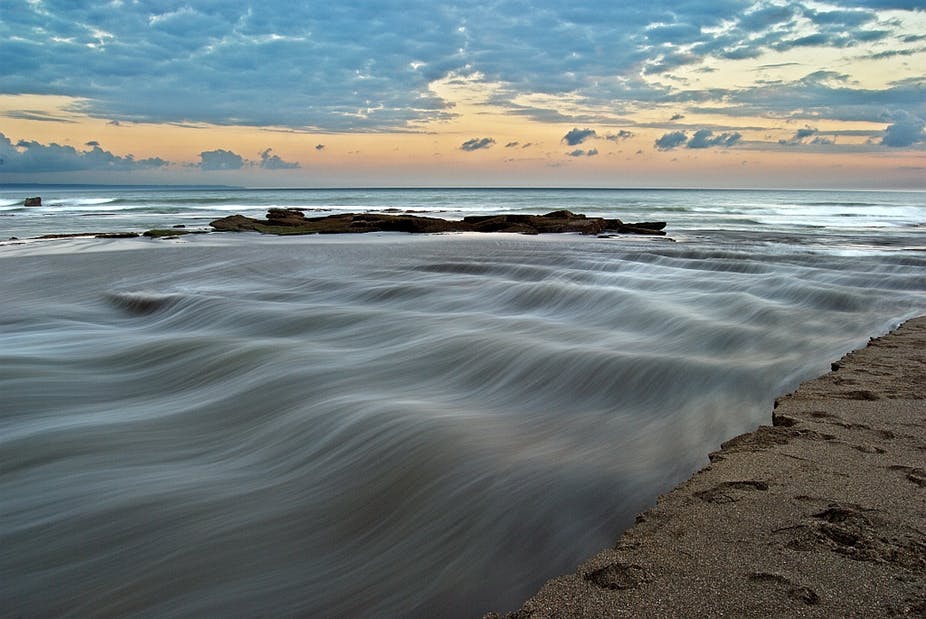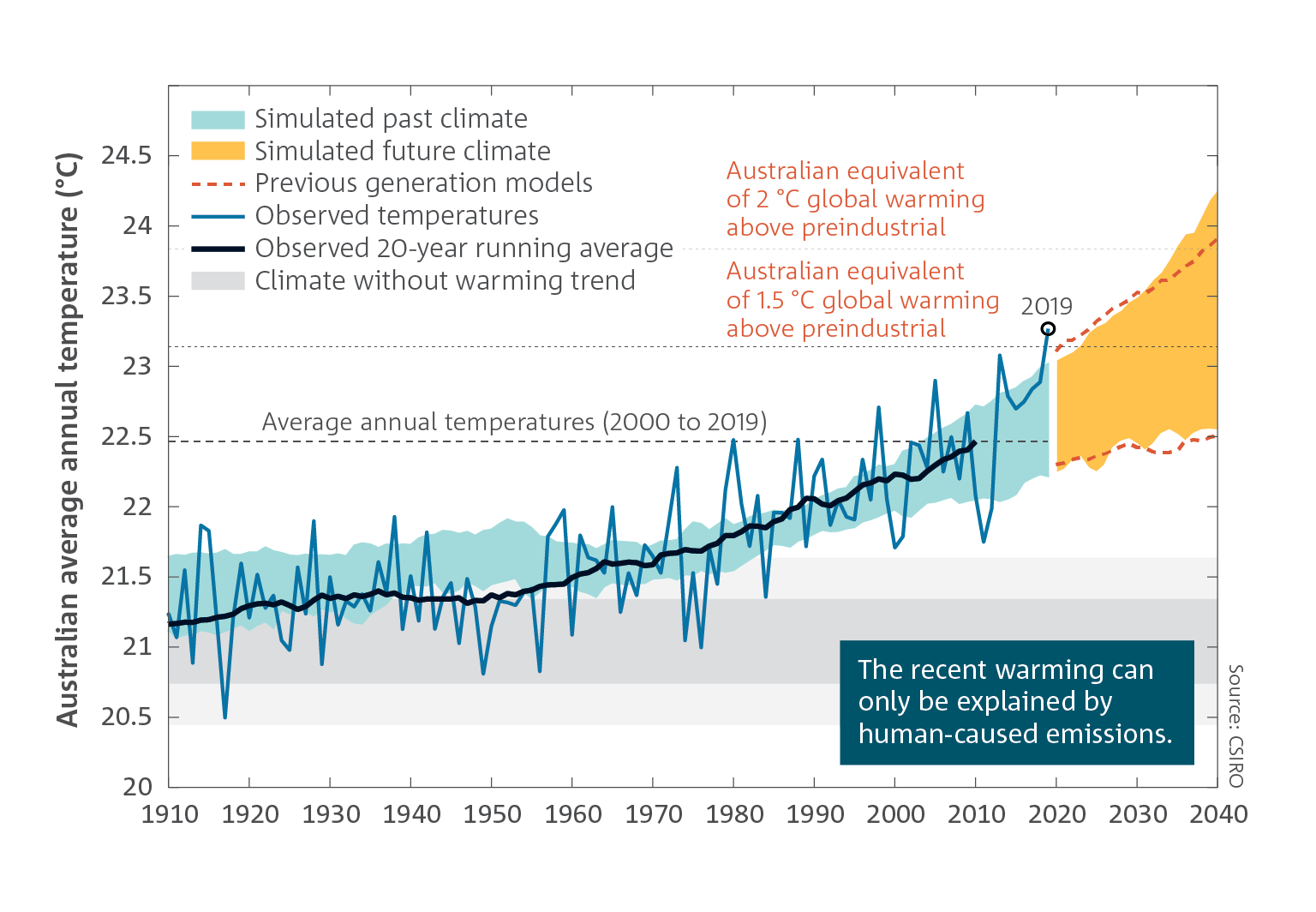How fast has the climate changed in the past?
Global
The Earth’s climate has always changed naturally. Usually, these changes take place over thousands of years, such as the coming and going of ice ages.
But the climate is now changing much faster due to changes to the atmosphere caused by human activities. Burning fossil fuels releases greenhouse gases that enhance the Earth’s natural greenhouse effect, causing warming.
Evidence from air trapped in ice cores shows that the current rate of warming is occurring at a faster rate than has occurred in thousands of years. Recent warming has occurred about 10 times faster than warming at the end of an ice age.
The increase of carbon dioxide due to human activities is occurring more than 250 times faster than at the end of the last Ice Age.
Sea level is rising due to human activities, with the rise accelerating in recent years. The rate of global mean sea-level rise has more than doubled, from 1.5 ± 0.2 cm per decade over most of the 1900s to 3.5 ± 0.4 cm per decade recently (1993–2019). 
Australia
Australia’s climate has warmed by 1.44 ± 0.24 °C since 1910.
Most of the warming has occurred since 1950. Of the 9 warmest years on record, 7 of these were 2013-2019, with 2019 the warmest.
Rainfall, streamflow and snow across southern Australia have decreased in recent decades.
Australia has experienced an average increase in temperature across every season and during both the day and night.
Sea surface temperatures have also increased. Since 1993, Australia sea levels in northern and south-eastern regions have risen significantly more than the global average. The sea level on other stretches of our coastline has risen similarly to global averages.
Our climate is changing faster than before, but it still varies from year to year because of large scale climate processes such as El Niño and La Niña.
How fast will climate change in future?
The extent of future climate change depends on how we act now, with future warming depending on how much greenhouse gas we emit.

Global
If we reduce emissions, global average temperatures are predicted to rise by 0.3-1.7°C degrees.
Sea levels are predicted to rise by 26-55 cm. But if we do not reduce emissions, then average temperatures are expected to rise by 2.4-4.8°C.
Between 2080 and 2100 the sea level is projected to rise 45-86 cm compared to what it was from 1986 to 2005.
After 2100, sea levels will continue to rise, by between 1 and3 metres, depending on future global emission levels.
Australia
2019 was Australia’s hottest year on record.
But if the global average temperature increases to 1.5°C higher than it was during the period 1850-1900, then years like 2019 will become an average year.
Sea levels around Australia’s coastline will continue to rise, with some areas rising more than others.
How fast has the climate changed in the past?
Global
The Earth’s climate has always changed naturally. Usually, these changes take place over thousands of years, such as the coming and going of ice ages.
But the climate is now changing much faster due to changes to the atmosphere caused by human activities. Burning fossil fuels releases greenhouse gases that enhance the Earth’s natural greenhouse effect, causing warming.
Evidence from air trapped in ice cores shows that the current rate of warming is occurring at a faster rate than has occurred in thousands of years. Recent warming has occurred about 10 times faster than warming at the end of an ice age.
The increase of carbon dioxide due to human activities is occurring more than 250 times faster than at the end of the last Ice Age.
Sea level is rising due to human activities, with the rise accelerating in recent years. The rate of global mean sea-level rise has more than doubled, from 1.5 ± 0.2 cm per decade over most of the 1900s to 3.5 ± 0.4 cm per decade recently (1993–2019).
Australia
Australia’s climate has warmed by 1.44 ± 0.24 °C since 1910.
Most of the warming has occurred since 1950. Of the 9 warmest years on record, 7 of these were 2013-2019, with 2019 the warmest.
Rainfall, streamflow and snow across southern Australia have decreased in recent decades.
Australia has experienced an average increase in temperature across every season and during both the day and night.
Sea surface temperatures have also increased. Since 1993, Australia sea levels in northern and south-eastern regions have risen significantly more than the global average. The sea level on other stretches of our coastline has risen similarly to global averages.
Our climate is changing faster than before, but it still varies from year to year because of large scale climate processes such as El Niño and La Niña.
How fast will climate change in future?
The extent of future climate change depends on how we act now, with future warming depending on how much greenhouse gas we emit.
Global
If we reduce emissions, global average temperatures are predicted to rise by 0.3-1.7°C degrees.
Sea levels are predicted to rise by 26-55 cm. But if we do not reduce emissions, then average temperatures are expected to rise by 2.4-4.8°C.
Between 2080 and 2100 the sea level is projected to rise 45-86 cm compared to what it was from 1986 to 2005.
After 2100, sea levels will continue to rise, by between 1 and3 metres, depending on future global emission levels.
Australia
2019 was Australia’s hottest year on record.
But if the global average temperature increases to 1.5°C higher than it was during the period 1850-1900, then years like 2019 will become an average year.
Sea levels around Australia’s coastline will continue to rise, with some areas rising more than others.
